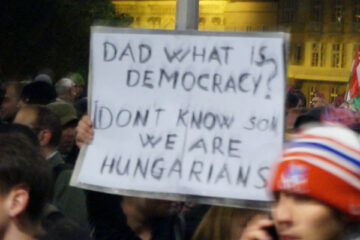Holly Case in the Boston Review:
 Last September an article on the front page of a leading Hungarian daily began, “The story of the ever-deepening refugee crisis is taking ever more unexpected turns.” A prominent Hungarian intellectual and former dissident, György Konrád, had come out in support of the efforts of the Hungarian government to build a wall to keep out newcomers and to cast them as economic opportunists rather than political refugees. In another corner of the Hungarian media, pundits were citing passages from The Final Tavern (A végső kocsma), a 2014 book by Holocaust survivor and 2002 Nobel laureate Imre Kertész, who passed away last month. In the book, Kertész was sharply critical of liberals’ welcoming attitude toward Muslim refugees and migrants. His and Konrád’s statements were registered with incredulity in the liberal press and with undisguised relish on the right.
Last September an article on the front page of a leading Hungarian daily began, “The story of the ever-deepening refugee crisis is taking ever more unexpected turns.” A prominent Hungarian intellectual and former dissident, György Konrád, had come out in support of the efforts of the Hungarian government to build a wall to keep out newcomers and to cast them as economic opportunists rather than political refugees. In another corner of the Hungarian media, pundits were citing passages from The Final Tavern (A végső kocsma), a 2014 book by Holocaust survivor and 2002 Nobel laureate Imre Kertész, who passed away last month. In the book, Kertész was sharply critical of liberals’ welcoming attitude toward Muslim refugees and migrants. His and Konrád’s statements were registered with incredulity in the liberal press and with undisguised relish on the right.
Anyone who has followed the serpentine trajectory of Hungarian politics since the controlled collapse of state socialism in 1989 might be forgiven for throwing their hands up in confusion. For more than two and a half decades, Hungarian political life has been a story of reversals.
More here.
